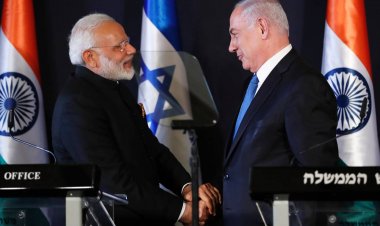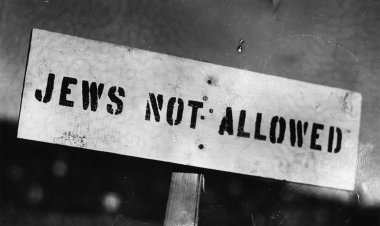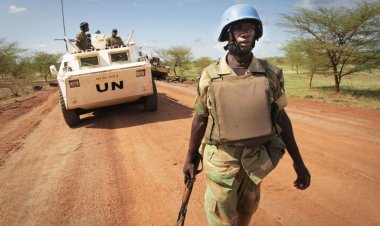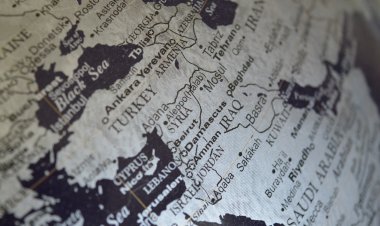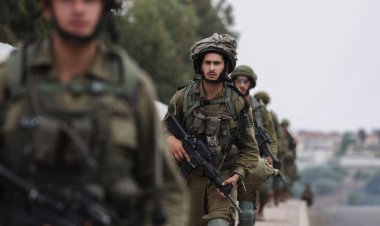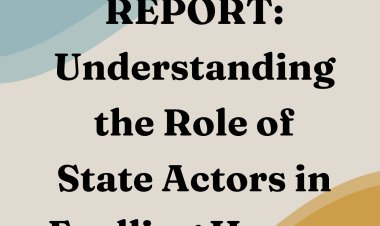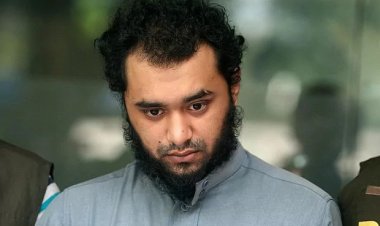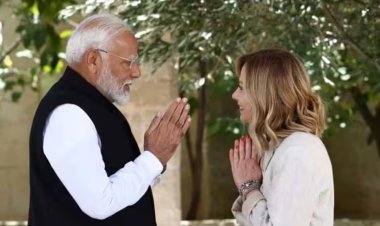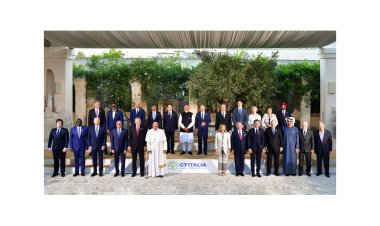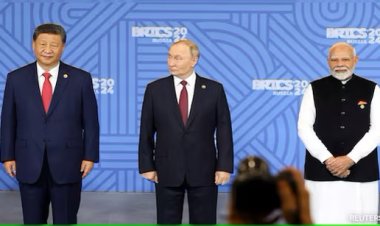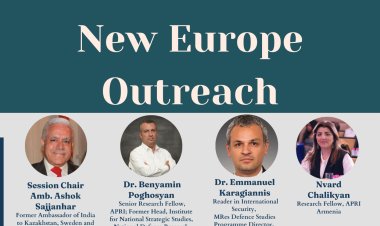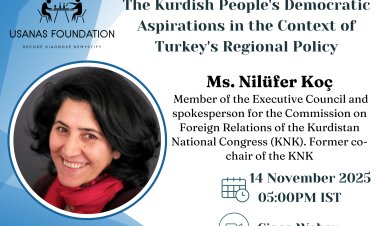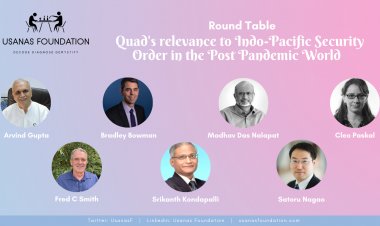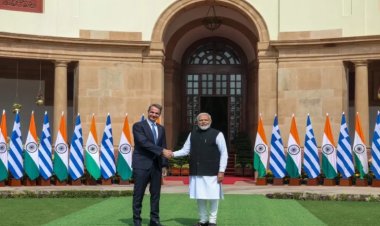Democratic Integration: The Kurds’ Proposal for a Peaceful West Asia
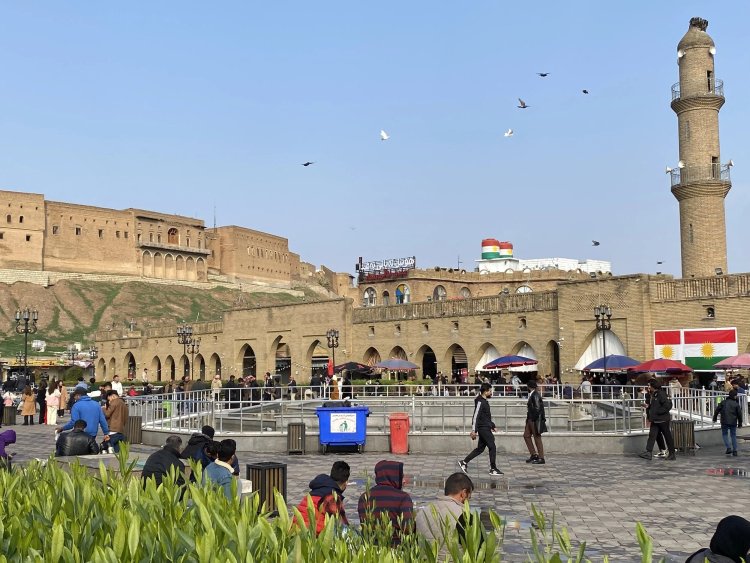
Analysis
By Nilüfer Koç, Kurdistan National Congress (KNK), Member of KNK Executive Council
For more than a century, West Asia has been a region marked by war, conflict, and foreign intervention. Today’s multiple crises in the region are not merely the result of military conflicts or border disputes, but rather the reflection of much deeper and more structural questions. These issues concern how people will live together, what forms of government will be established, and whether the diversity of the region will be recognized. Countries such as Syria have essentially turned into a security laboratory due to the collapse of state authority, the emergence of parallel armed and political structures, and the interventions of global powers. Despite the heavy toll of these developments on the Kurds, they have succeeded in developing a new approach to peace and security. It is their focus on a political and legal struggle as part of a process of ‘democratic integration’ that has turned them into a sought-after actor in today’s West Asia.
The historical roots of the ‘Kurdish question'
To understand the current crisis in the region, one needs to look back at least a century ago and return to the Sykes-Picot Agreement (1916) or the Treaty of Lausanne (1923). The borders drawn at that time fragmented the historical unity of the peoples in the region. The new states created according to the interests of external powers established centralized structures that denied the plurality of society. These borders were often incompatible with local realities and instead created artificial divisions. As a result, the region was turned into a fragile security landscape open to constant intervention. However, it is important to note that the above-mentioned treaties themselves are not the root cause of today's problems. Rather, they provide a backdrop for understanding the origin of today’s crisis. The central issue is that the regimes built upon this fragile legacy have defined security solely through repression and exclusion.
The Kurds are one of the peoples who have suffered the most severe consequences ever since. With the collapse of the Ottoman Empire, the Sykes-Picot Agreement, and subsequently the Treaty of Lausanne, Kurdistan was divided among four states: Turkey, Iran, Iraq, and Syria. Not only were the Kurds thus denied a status, but their very existence was put into question as part of the official policies of these states. This meant not merely a denial of political and cultural rights, but a century-long process of identity erasure, forced assimilation, and policies of annihilation. The Kurdish uprisings and the state repression they faced throughout the 20th century are among the most fundamental factors explaining why the ‘Kurdish question’ has become a central issue of stability and democracy in West Asia. The issue draws its roots from this policy of division and denial.
The beginning of a new West Asia in the early 2000s
The 2000s marked a turning point for the fragile West Asian order established during World War I. The collapse of Saddam Hussein's dictatorial state authority with the invasion of Iraq sharpened the Sunni-Shia fault lines and created fertile ground for the rise of radical groups. During Saddam's rule, Kurds had been targeted by systematic denial and extermination policies, with tens of thousands of civilians killed in operations such as Anfal in 1988, and a major crime of genocide committed with a chemical attack in the Kurdish city of Halabja in the same year. In 2005, the Kurds gained a federal status in the form of the Kurdistan Region of Iraq with the adoption of a new Iraqi constitution. However, this recognized status has not meant that Iraq became democratic, as authoritarianism and fragility still continue to exist in different forms.
During this period, the ‘Greater Middle East Project’ initiated by the US was presented as a means of democratizing and stabilizing the region. But in practice, it turned into a new framework for foreign intervention, further weakening fragile state structures from Iraq to Lebanon and Yemen. The uprisings that began in 2011, known as the Arab Spring, initially expressed the people's demands for freedom and democracy. But in most places, this process resulted in the resurgence of authoritarian and exclusionary regimes. The war in Syria has not only become a stage for the competition of global powers and proxy wars between regional actors, but as also severely disrupted the internal balances of the country. In this fragmented environment, radical Islamist groups have found a wide field of action. The Islamic State (IS) evolved particularly quickly into a structure that controlled large swathes of territory. Thus, the West Asian security crisis turned into a global issue.
A region faced with multiple crises
In the last 100 years, most West Asian states were shaped under single-party regimes that equated security with their own survival. This mindset, which suppresses differences, views diversity as a threat, and rejects the idea of equal citizenship, has fueled radicalism by expanding the social vacuum that feeds it. Sectarian fault lines have become both a tool for internal power struggles and an instrument of foreign policy for regional states. In Iraq, Shiite-dominated politics deepened feelings of exclusion among the Sunni community, while in Yemen, Saudi Arabia, and Iran's mutual interventions turned sectarian conflict into a proxy war. Thus, security crises became the product not only of internal dynamics but also of externally supported policies.
Turkey's role in the region has further exacerbated the crisis. For a long time, Turkey has not only tolerated Islamist proxy forces, but also trained, directed and deliberately used them for its own political goals[1]. The country’s borders have been turned into logistical routes for these groups, facilitating the movement of their members and the shipment of weapons. Turkey's use of these proxy forces has weakened security not only in Syria but throughout West Asia and even in other neighboring regions. This policy has consequently led to an increase of instability and radicalism.
As a result of the conflict in the region, millions of people have been displaced. The waves of migration that began with the war in Syria have caused a crisis that extends not only to neighboring countries but also to Europe. Millions of people left in refugee camps without security, future, or identity have exposed the scale of the humanitarian disaster. Whole areas in Iraq and Syria have been emptied, and cities reduced to ruins. These massive migration movements are not only a humanitarian tragedy but also a structural security challenge that strains the capacity of states.
Women have suffered the brunt of the conflict. They are not merely passive victims of war, but also direct targets. Islamist proxy forces turned enslavement, sexual violence, forced marriage, and forced conversion into weapons of war. The genocide perpetrated against Ezidi women in 2014 is the most striking example of this reality[2]. These impositions are not only directed against women but also constitute an attack on the entire population through the erosion of their identity and beliefs.
Turkey’s militarist approach towards the Kurds has failed
It is precisely in this crisis-ridden context that Abdullah Öcalan sees an opportunity for democracy and peace. He and the Kurdish movement are confident that political steps – even though small and taken step by step – are possible. Since Öcalan made his historic ‘Call for Peace and a Democratic Society’ on February 27[3], the Kurdish side has taken numerous concrete steps to politically resolve the century-old Kurdish question in Turkey. Particularly significant steps are the decision of the Kurdistan Workers’ Party (PKK) to dissolve itself after 47 years, the PKK’s declared willingness to end its 41-year-old armed struggle[4], and the public burning of weapons on July 11 by 30 PKK members[5]. These decisions are historic measures intended to facilitate the dialogue with the Turkish state. Öcalan described the underlying spirit of these steps as follows: “Those who have fought each other know each other best. Therefore, only those who have fought each other can make peace.”
In addition to today’s growing international isolation of Turkey, two other developments are particularly important to understand the renewed dialogue between Öcalan and the Turkish state. First, the century-old denial of the Kurds has been overcome by the PKK's decades-long struggle. Today, the Kurds are an actor both regionally and internationally. Their historical, cultural and political existence has been accepted. Now, the issue is in which way the Kurds will find their place as equal citizens in Turkey, Iran, and Syria. Secondly, Erdoğan had promised the Turkish state that he would bring the Kurds to their knees by military force. The result has been years of uninterrupted war by the Turkish state since 2015, including the use of chemical weapons against Kurdish guerrilla forces in the Kurdistan Region of Iraq[6]ten thousand political prisoners in Turkey, permanent drone warfare in Syria and Iraq and the occupation of parts of these two neighboring countries. However, the Kurds were not defeated. Instead, they have transformed themselves into a widely accepted actor in West Asia.
The Kurds are now in a position to achieve their goals through political and legal struggle. Since the beginning of their armed resistance in 1984, they have gradually freed themselves from the destructive impacts of colonial assimilation policies. A strong sense of national unity among the Kurds has become the norm today. Thus, they have both theoretically and practically overcome the old West Asian order established through agreements such as Sykes-Picot or Lausanne. Abdullah Öcalan would not have been able to initiate the current dialogue with the Turkish state if he had not been aware of the organised strength and political consciousness of his movement and the Kurdish people.
Democratic integration as the Kurds’ new approach to security
In this complex and volatile regional context, the Kurds have developed a different perspective to solve the multiple crises. They have become one of the most effective actors on the ground in the fight against IS. This represents not only a military success but also a transformation in the understanding of security. The Kurds today propose that security should be established not only through force, but also through the equal participation of all peoples. They continue to insist on democracy as the fundamental basis for security. The model they put forward centers around the recognition of all ethnic and religious groups, their direct participation in politics through local governance mechanisms, and, in particular, the equal representation of women[7]. Local councils, women's organizations, and the co-chair system have since demonstrated that security cannot be sustained without gender equality. Thus, an approach has emerged that goes beyond a military doctrine and links security to social peace and democratization. In this sense, the Kurdish struggle has become a model that serves not only their own people but all communities in Syria and broader West Asia.
This approach is also part of the ongoing dialogue between the Kurdish people's leader, Abdullah Öcalan and the Turkish state. It means that the solution proposed by the Kurds is not to establish a separate nation-state, but to achieve democratic integration in the countries where they live on the basis of equal citizenship[8]. This is because, under the current conditions in the region, new nation-states would only deepen the problem. From the Kurdish perspective, democratizing existing states offers a much more sustainable solution than creating new borders and divisions. This vision represents a perspective that redefines security and coexistence for both Kurds and the other peoples of the region.
The following reality has been repeatedly confirmed in the recent history of West Asia: Temporary solutions, superficial security policies, and short-sighted justice mechanisms aimed at saving the day do not eliminate problems but rather deepen them. Every crisis that is suppressed eventually resurfaces elsewhere. The attacks by forces of the Syrian Interim Government on the Druze community in July 2025 are a recent example of this reality. Without the development of lasting and democratic solutions, sectarian violence and security vulnerabilities will continue to resurface in the region.
The security problems of West Asia have grown out of the legacy of borders drawn with a ruler a century ago and exclusionary regimes. Sectarian tensions, foreign intervention, migration, humanitarian disasters, and the violence of radical groups have combined with this legacy to produce the current crisis. However, the Kurdish people today offer a different perspective on security: equal citizenship, recognition of diverse identities, acknowledgement of local will, and gender equality. This is a vision that does not involve creating new states, but rather democratizing existing ones. Lasting security is only possible through equality and the coexistence of different people. The future of West Asia, therefore, depends on the question to which the ‘democratic integration’ proposed by the Kurds will be put into practice.
Disclaimer: This paper is the author's individual scholastic contribution and does not necessarily reflect the organization's viewpoint.
[1]https://rojavainformationcenter.org/2022/08/the-sna-encyclopedia-a-guide-to-the-turkish-proxy-militias/
[2]https://www.ohchr.org/en/press-releases/2024/08/ten-years-after-yazidi-genocide-un-syria-commission-inquiry-calls-justice
[3]https://english.anf-news.com/news/-78145
[4]https://english.anf-news.com/features/-79295
[5]https://bianet.org/haber/full-text-pkk-statement-during-disarmament-ceremony-309371
[6]https://www.ippnw.de/commonFiles/bilder/Frieden/2022_IPPNW_Report_on_possible_Turkish_CWC_violations_in_Northern_Iraq.pdf
[7]https://rojavainformationcenter.org/2023/12/aanes-social-contract-2023-edition/
[8]https://english.anf-news.com/features/-80196

